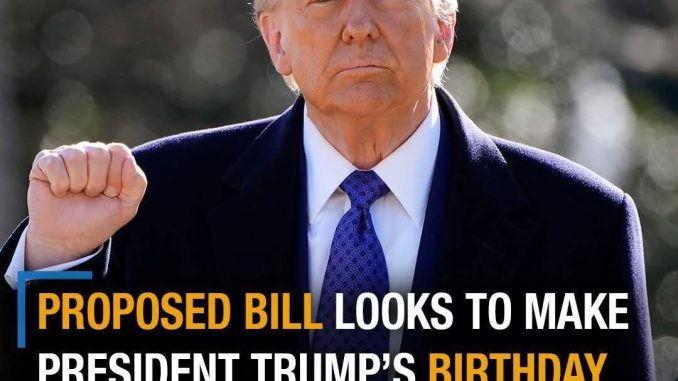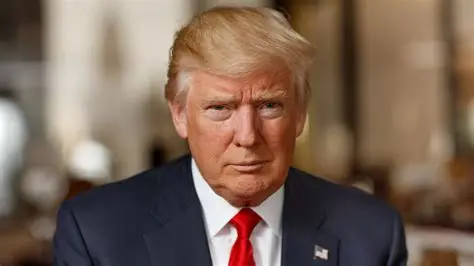
Proposed Bill Looks To Make Trump’s Birthday a Federal Holiday
Proposed Bill Looks To Make Trump’s Birthday a Federal Holiday
Washington, D.C. — In a move that has sparked both celebration and controversy, a group of Republican lawmakers has introduced a bill in Congress that would designate June 14th, the birthday of former President Donald J. Trump, as a federal holiday. Titled the Donald J. Trump Day Act, the bill seeks to honor the 45th President’s impact on American politics, economy, and national identity — but it’s already igniting fierce debate across party lines.
The proposed legislation was introduced Tuesday by Rep. Mike Collins (R-GA) along with six Republican co-sponsors. According to the language of the bill, the holiday would be “a day to recognize and celebrate the legacy, leadership, and patriotic contributions of Donald J. Trump, 45th President of the United States.”
“President Trump redefined what it means to put America first,” said Rep. Collins in a press conference. “This day will serve as a reminder of his unwavering defense of American values, economic strength, and commitment to national sovereignty.”

June 14: A Symbolic Date
Trump’s birthday, June 14th, coincides with Flag Day, which commemorates the adoption of the U.S. flag in 1777. The new bill proposes to merge the two commemorations into a single national holiday: “Trump and Flag Day”, blending what supporters see as symbolic patriotism with Trump’s image as a champion of American pride.
Rep. Collins explained that this choice was deliberate: “Flag Day already stands as a celebration of American strength and resilience. President Trump, more than any modern leader, embodied that strength. The alignment is perfect.”
Supporters Say It’s About Legacy
Among Trump’s loyal base, the bill is being hailed as long overdue. Supporters point to his administration’s record on tax reform, deregulation, border security, Middle East peace deals, and conservative judicial appointments as reasons why Trump deserves this rare distinction.
Rep. Marjorie Taylor Greene (R-GA) called the proposal “a fitting tribute to the man who restored pride in being American,” while Sen. J.D. Vance (R-OH) tweeted that “Donald Trump’s legacy is on par with that of Ronald Reagan — both deserve their own day.”
Trump himself responded to the news via Truth Social:
“HUMBLING HONOR! Many THANKS to the patriots in Congress pushing this beautiful legislation. June 14th is already special — now let’s make it HISTORIC. MAKE AMERICA GREAT AGAIN!!!”
Opposition Mounts Quickly
Democratic lawmakers were quick to criticize the proposal, calling it divisive, inappropriate, and a distraction from urgent national issues.
Rep. Alexandria Ocasio-Cortez (D-NY) posted, “We’re talking about honoring a man twice impeached, indicted in multiple cases, and responsible for one of the most polarizing periods in American history — and you want to give him a holiday?”
Senate Majority Leader Chuck Schumer (D-NY) labeled the proposal a “political stunt” and vowed that the bill would never pass in the upper chamber while Democrats hold control.
“Federal holidays are meant to unify, not divide,” said Schumer. “Lincoln, Washington, Martin Luther King Jr. — these are figures who brought the nation forward. Trump does not belong in that pantheon.”
Public Reaction Split Along Party Lines
Public opinion is sharply divided. In an overnight flash poll conducted by Gallup, 61% of Republican respondents supported the creation of a Trump-themed federal holiday, while 82% of Democrats opposed it. Independents were more divided, with only 35% in favor.
In conservative strongholds like Texas, Florida, and Alabama, social media was flooded with posts of support, using hashtags like #TrumpDay, #June14MAGA, and #AmericaFirstHoliday.
Meanwhile, in more liberal enclaves, critics mocked the bill:
“Let’s not forget this man encouraged an insurrection and tried to overturn an election,” wrote one user on X. “Is that the kind of legacy we want to celebrate?”

Experts Weigh In
Political historians and legal scholars have also expressed concern about the precedent such a holiday would set.
Dr. Fiona Matthews, a professor of American Studies at Georgetown University, said, “No modern president — not even Reagan — has been granted a federal holiday. To elevate Trump to that status so soon after leaving office, and while he remains a polarizing and legally embattled figure, would be unprecedented.”
Legal scholars note that creating a new federal holiday requires an act of Congress and the president’s signature. With President Joe Biden in office and Democrats holding the Senate, the bill’s chances of passing in the current session appear extremely slim.
What’s Next for the Bill?
The Donald J. Trump Day Act has been referred to the House Oversight and Accountability Committee, where it will face initial review. With Republicans holding a narrow majority in the House, the bill could move forward — but it faces near-certain failure in the Senate.
Still, some GOP lawmakers say they’re willing to keep reintroducing the measure until it gains traction.
“Even if it doesn’t pass this session, the conversation has started,” said Rep. Lauren Boebert (R-CO). “History will look back and recognize the greatness of President Trump — whether the left likes it or not.”
The Bottom Line
The proposed Trump birthday holiday underscores the deep political divisions in the U.S. and reflects the continuing impact of Donald Trump’s presidency on American culture and governance. Whether symbolic or serious, the bill has ignited a firestorm — one likely to grow as the 2026 election cycle heats up.
One thing is clear: For Trump’s supporters, every June 14th is already worth celebrating. Now, they want the whole country to join in.
Leave a Reply